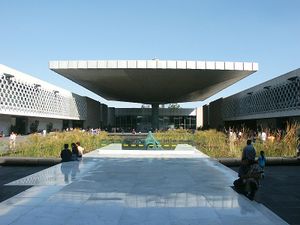Anthropology

Anthropology (Greek: ἄνθρωπος, anthrōpos: "man"; and -λογία, logia, "study") is a science which studies the human condition, including past, present, and future; biology, society, language and culture.
Anthropology in the United States is divided into four separate disciplines, which overlap each other to varying degrees. Recently, anthropology was dominated by the leftists, as well as pushing Marxist agendas openly.
Contents
Cultural anthropology
Anthropology is the study of humans through time and space. Anthropological research is conducted with scientific methodology. Anthropology is broken into four sub fields: Cultural Anthropology, Archaeology, Biological/Physical Anthropology and Linguistic Anthropology. Even though anthropologists will specialize in one of the sub fields, because Anthropologists view all the components of humanity (biology/culture/language/history) as an inter-related whole, they generally have an understanding of the others. All Anthropologists rely heavily on relevant literature to create a foundation for a specific project. After the foundation is created an Anthropologist will then conduct "field work."
Anthropology as a formal academic field was created in response to the racist policies that justified colonial expansion during the end of the 19th century. Anthropologists sought and continue to seek to shed cultural biases/ethnocentrism and give an objective explanation for a culture's behaviors. While Cultural anthropologists are currently in great demand by international corporations and the American Armed Forces (human terrain system), most anthropologists tend to shun such work as imperialistic, colonial and damaging to the cultures they work with.
Recently, many ethnographers are working in their own societies, studying social interaction among immigrant workers, the societies of homeless people, and the lives of Wall Street investors.
Cultural anthropology has several sub-fields, among them:
- Applied anthropology
- The application of anthropological theory to practical problems.
- Economic anthropology
- The study of systems of production, exchange, and trade.
- Political anthropology
- The study of the political process and institutions.
- Urban anthropology
- The study of humanity, culture, and social settings from within an urban environment.
Physical anthropology
The study of Homo sapiens from a mainly-evolutionary point of view. Physical anthropologists are also trained in skeletal analysis, and forensic and medical anthropology, and are often called upon to assist in criminal investigations. Sub-fields include:
- A field related to Darwinian evolution, paleoanthropologists study human ancestry, including fossils, trackways and other trace remains prior to the written record.
- Forensic anthropology
- A science concerned with the post mortem identification of deceased persons, of which gathered evidence is used in a court of law.
- Human ecology
- The study of human adaptations to the environment.
- Osteology
- The study of bones in a biocultural context, including birth, growth, development, age, and death.
- Paleopathology
- The study of ancient diseases.
Linguistic anthropology
The study languages, their development, and how they influence social life. Linguistic anthropology was once a sub-field of cultural anthropology.
Archaeology
The study of man through the material remains of cultures. There are many subfields within archaeology. Most archaeologists are involved in academia, studying a specific culture or cultural area's past. There are also many applied archaeologists who work for contractor companies or the government to preserve archaeological sites around the world.